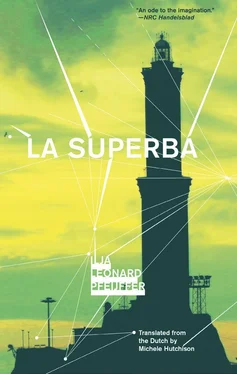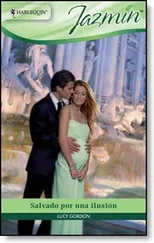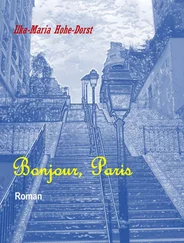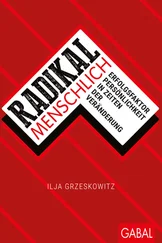“The driver began to change the tire with our help. In the meantime, the question was what to do with the dead and the wounded. The driver was a good person. He said he could ask for help via satellite telephone. But that would mean us being taken back to Agadez. No one was up for that. There was almost an uprising. Punches were thrown. And then we just left them behind. We took the walking wounded with us, but we laid the hopeless cases next to the dead bodies in the sand and went on our way. Do you know what the worse thing was, Ilja?”
He took a sip of his beer.
“That night, in those circumstances, I completely agreed with the decision.”
He began to laugh. Then he stared ahead. He looked at me and began to laugh again.
“Why are you laughing, Djiby?”
“I don’t know. Because I made it. Because I reached the Libyan coast, where I was politely handed over to the sadists who stole my money and kicked and punched me for weeks on end because there was no money left to take from me. Because I’m in the Promised Land now, drinking beer with you, a writer, who is interested in my tale of woe. That’s why I’m laughing. Because I’m too thirsty to cry.”
9.
“We were kicked awake by Libyans in the middle of the night. They said our boat was ready and we had to leave as fast as possible. They said we still had to pay. We’d already paid. It was for our accommodation, they said.” He began to laugh. “Can you imagine how funny I found that? They’d locked us up in a tiny barracks without any ventilation under the burning sun of the Libyan coast for weeks. They’d exploited us, hit us, and tortured us. They’d raped the women. Sometimes several times on the same day, six or seven of them at a time. And now they were telling us, as cool as you please, that the hotel costs for our luxurious stay at the welcoming Libyan seaside were going to be deducted from the advance we had paid and that we owed them a new fee for the crossing.
“But the fact I found that funny was something they didn’t find funny at all. They hit me and spit in my face. It was their way of making it clear that they weren’t joking. They lack a sense of humor, the Libyans. We managed to scrape a bit of money together as a group. They wanted more but when they realized it was all we had, they were happy to take it. They took us to the tideline in the pitch dark. And that’s where our ship would be waiting, the lily-white ship of our dreams that would take us to Europe, its proud prow cleaving the water. Our journey had been difficult but finally we had reached our goal. Once we were finally onboard our ship, reaching paradise would be a breeze.”
He took a sip of his beer. “And there was our ship. They shined their torches at it.” He laughed. “It was a rubber dinghy. One of those simple orange things. About as long as from you to the next table there. I swear it, no bigger than that. Seven meters, max. And there were fifty-one of us. Men, women, two of them pregnant. There was even a little girl, Julia she was called, a sweet little kid, we all adored her. Most of them were Senegalese like me, but there were also a couple of Eritreans, two boys from Mali, and an Egyptian. Well, that isn’t really important. What’s important is that there were fifty-one people and that boat was hardly bigger than a bathtub.
But the Libyans meant it. They herded us aboard. They gave us a jerry can of gasoline for the outboard motor and two bottles of water. We asked whether that was enough. They said we shouldn’t complain, Lampedusa was close by and Lampedusa was Italy and Italy was Europe. We asked how far it was. A couple of hours sailing, they said. We asked which way it was. North, they said, you can’t miss it. They disappeared into the night. We managed to pour the gasoline into the tank in the dark without spilling too much and get the motor started. We sailed off, onto the open sea, on our way to the promised land where we would get rich without even trying.”
10.
“At first we were overjoyed. A feeling of euphoria came over us — do you get that, Ilja? The sea was black and smooth under a black, smooth night sky. We were on our way. The light from the barracks where we’d been abused for weeks soon disappeared from view. We were free. Do you get what I’m saying, Ilja? We were free.
“We were sitting on each other’s laps. I got cramp in my left leg, but I couldn’t change my position, there wasn’t enough space. But it wouldn’t be long. Africa was a long way behind us. Europe was shining on the horizon. We began to sing. Not ‘ Fatou yo ’ but happy songs. The Egyptians told jokes in Arabic that we only half understood. But we laughed loudly all the same. We were happy. We were so happy, Ilja.”
He took another sip of his beer. He didn’t carry on.
“What are you thinking about, Djiby?”
“Julia.”
“That little girl?”
“But you have to imagine, Ilja. Once we’d lost sight of the Libyan coast, we couldn’t see anything anymore. Then we stopped singing. There was no moon. You couldn’t see whether we were going backwards or forwards. We drifted on an inky sea under inky heavens. How much black ink do you need to write down our dreams on black paper? And who will read them? Do you understand, Ilja? You have a pen and a name.”
“Carry on with the story.”
“After that it got really frightening. The sea that had seemed so smooth when we left began to swell dangerously. The waves were sometimes meters high. The women screamed. Julia had her hands in front of her face, too scared to cry. And it’s almost unimaginable if you’ve just left the suffocating heat of Africa behind, but it was cold at sea. There was a persistent, strong, icy wind. Most of us were wearing nothing more than T-shirts and shorts. Luckily it wasn’t far. Not long now and we’d be there. But how did we know whether we were going in the right direction? One of the Malians said he could navigate by the stars. He’d learned that in the desert, but were the stars above the sea the same stars? There was uncertainty in his voice. He tried to reassure us and himself by saying that we simply had to go north and that was the easiest of all directions.
“We began to take on water because we were too overloaded. But we didn’t really worry about that because we were nearly there. We emptied two bottles of water into the sea and cut them in half to make cups to use for bailing. It was nighttime. We had to survive the night. If we survived the night we’d land on one of Europe’s golden beaches.”
“Do you want another beer, Djiby?”
He laughed. “You know what was funny? Yes, I do want another beer. What’s really funny is that we were happy when the sun came up.”
“Why was that funny?”
“I’ve laughed enough today, Ilja. I’m going to drink my beer and…”
He choked. I slapped his back. “Thank you,” he said. “See you tomorrow.”
11.
“Why was it funny that the sun came up?”
Djiby had to laugh at my question. “But Ilja, you’ve got to be kidding. It’s always funny when the sun comes up. Then you think your nightmares are over, just because a new day is starting. It makes me laugh.”
“And then?”
“We were happy to see the sea. The sea looks a lot less scary by daylight than when you’re at its mercy in the pitch dark. It was calm and blue. It was transparent and glistened. This was the Mediterranean Sea we’d been taught to dream of, just as the same can be said of you. For us, it was the topaz highway to our dreams.”
“What went wrong?”
“What went wrong, what went wrong? Ilja, you’re such a terrible interviewer. Let me just tell it. It’ll save us both a lot of bother.” He laughed. “But the funniest thing was that the sunlight wasn’t our friend.”
Читать дальше












